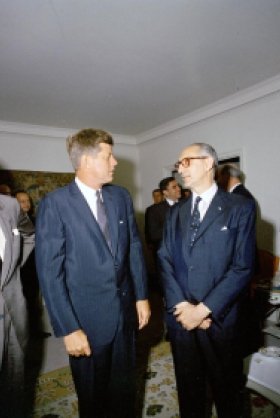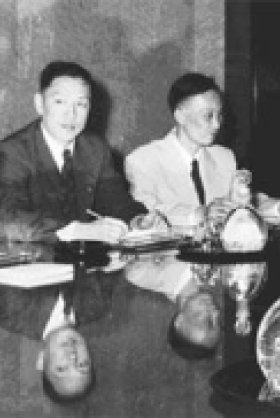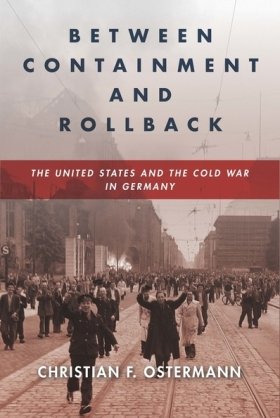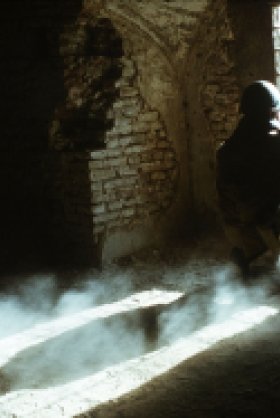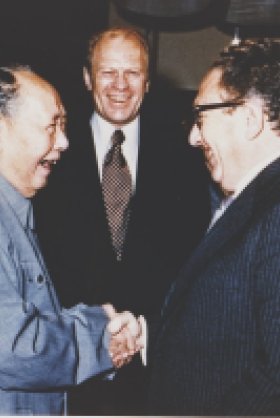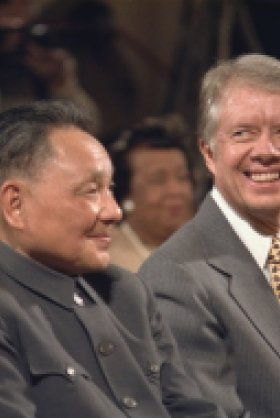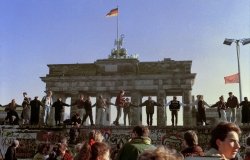South and Southeast Asian Views of the Cold War (1945-1991): Negotiating Imperial Retreat and the Cold War
Call for Contributions: South and Southeast Asian Views of the Cold War(1945-1991): Negotiating Imperial Retreat and the Cold WarCWIHP invites submissions for a Special Issue of the Cold War International History Project Bulletin.
Call for Contributions: South and Southeast Asian Views of the Cold War
(1945-1991): Negotiating Imperial Retreat and the Cold War
A Special Issue of the Cold War International History Project Bulletin
Just as the outbreak of the Cold War in Europe after WWII forced Western
European leaders to rethink their security and their places in the world, so too did the arrival of the Cold War to Asia force South and Southeast Asian
countries to make equally hard and historically important choices.
Moreover, if former European colonial powers soon found their interests in
Asia influenced by Cold War imperatives, Asian nationalists found their efforts to promote a decolonized region complicated by the Cold War. Much has been written on the process of imperial withdrawal from Asia.
Surprisingly, we still know preciously little about how newly independent
South and Southeast Asian countries viewed and dealt with the Cold War; the
policies and actions of the retreating Western imperial powers and the
Americans arriving on the scene. Nor do we know much about how the communist
giants, China and the USSR, viewed these countries trying to run a
middle-course. And yet the Non-Aligned Movement clearly emerged in this
context of negotiating Imperial Retreat and the Cold War.
In order to throw new light on these matters, the Cold War International
History Project in Washington D.C. plans to publish a special
issue/section of the Cold War International History Bulletin featuring commented and annotated translations of selected primary documents on South and Southeast Asian reactions to and views of the Cold War (1945-1991).
Potential Themes and Topics
We are very interested in publishing the translation of primary documents
related to the following themes and topics:
1) How did South and Southeast Asians react to and view Western imperial
retreat and the arrival of the Cold War?
Possible topics: Asian diplomatic recognition of Bao Dai or Ho Chi Minh,
views of the Chinese communist victory and territorial consolidation
(Tibet), visions of SEATO, support of Indonesian independence, reactions of
French defeat at Dien Bien Phu, repression of communist parties and
anticommunism, Non Aligned Movement, Lao Crisis, Vietnam War and Asian
involvement in it (Chinese, Thai, Filipino), policies towards the
Sino-Soviet split, reactions to the Soviet invasion of Afghanistan as
"imperial return", etc.
2) How did the major communist powers -- the Soviet Union and China for
example -- view communist parties in South and Southeast Asia on the one
hand and how did they perceive the emergence of non-aligned leaders and
states in South and Southeast Asia trying to negotiate between the "East"
and the "West", the "Free World" and the "Communist World" or splits in the
communist world.
Possible topics: Soviet and Chinese views of independence movements in
South and Southeast Asia, support or non support of communist parties in
South or Southeast Asia, support NAM, ASEAN or Chinese and Vietnamese
communist policies towards the Asian "Third World" for internal
legitimating reasons or as diplomatic arms against the USA or the USSR.
3) The Nature of Inter-Asian Contacts and Consultations on Cold War issues
Possible topics include the Non-Aligned Movement, views of, creation of and
roles in ASEAN, reactions to the fall of Saigon in 1975, South and Southeast
Asian reactions to the Sino-Vietnamese war of 1979, or the Vietnamese
overthrow of the Khmer Rouge, or the development of a wider Asian led "Third
Way" in international relations as diplomatic policy (relations with
Algeria, Egypt, Cuba).
Types of Documents
No one researcher can know all the languages for South and Southeast Asia.
This Bulletin issue seeks to make accessible particularly important and
previously unpublished primary documents that can be of use in English
translation to other scholars and students working on and studying various
aspects of the Cold War. We are interested in locating and translating
documents which focus on one of the topics suggested above or evoke in
concrete ways the major themes of this project. We are particularly
interested in publishing internal documents coming from Asian archives and
are thus able to throw new light on how Asians saw these matters.
(Excessively long documents cannot be published, given space limitations.
However, long documents can be abridged, if necessary.)
To consult earlier issues of the CWIHP Bulletin, see:
http://wwics.si.edu/index.cfm?topic_id=1409&fuseaction=topics.publications&group_id=11900
Presentation of the Documents
Contributors are asked to translate carefully and reliably their selected
documents into English, preserving as much as they can the original
"flavor" of the style of the text. Contributors are also asked to annotate
their translations, identifying people, places and events mentioned in the
documents. In addition, contributors can present three-to-five page (Times
12 pt, 1.5 spacing) commentaries on their document(s), explaining its
(their) historical importance, presenting their analysis and linking it to the overall project themes and other documents. Contributors will, of
course, be credited for both their translations and commentaries.
Deadlines
Those interested in participating in this project are asked to send a
short description of their document, its exact provenance, approximate length, and its relationship to the project themes. They should also send a cv, making sure to include their institutional affiliation, area of expertise and list of publications. Translations and commentaries (and if possible copies of the original documents) should be sent electronically to Christopher
Goscha (cgoscha@club-internet.fr) and Christian Ostermann (ostermac@wwic.si.edu) by
28 February 2004.
Contributors will be asked to provide a final translations and commentaries by 20 May 2004.
Related Program

Cold War International History Project
The Cold War International History Project supports the full and prompt release of historical materials by governments on all sides of the Cold War. Through an award winning Digital Archive, the Project allows scholars, journalists, students, and the interested public to reassess the Cold War and its many contemporary legacies. It is part of the Wilson Center's History and Public Policy Program. Read more
